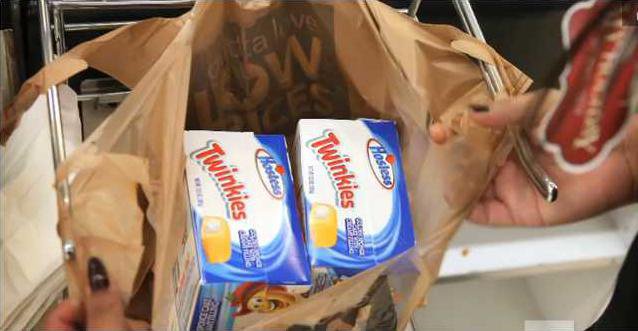That maker of cream-filled snack foods, Hostess Brands, will soon not only be under new corporate ownership, but its shares will be up for grabs, as the soon-to-be public company announced Tuesday.
First founded in 1919, Hostess Brands has now sold a majority stake for about $725 million to Gores Holdings, a publicly traded arm of the investment firm Gores Group, according to The New York Times.
The deal, which has Gores contributing $375 million of the price tag with additional investors chipping in $350 million, will boost the companys and its owners' portfolios, with its first sale of stocks expected to value the company at $2.3 billion, according to CNN.
This will be the second time that Hostess has passed from owner to owner since the company emerged from bankruptcy protection three years ago, The New York Times noted. Since then, Hostess has been owned by both investment firm Apollo Global Management and Metropoulos & Company, it added.
And it comes four years after Hostess parent company filed for bankruptcy protection, prompting fears that Twinkies might become extinct, writes Michael de la Merced for The New York Times. Hostess was then sold to Apollo and Metropoulos, experienced players at turning a corporation around, in spring 2013 for about $410 million, it added.
Under Apollo and Metropoulos, Hostess Brands earned revenue of about $650 million last year, with its credit rating on the mend, noted the Chicago Tribune. The two will still own 42 percent of the combined company, to be renamed Hostess Brands Inc., after the deal, according to Bloomberg.
Some things will not change such as the companys leadership. Hostess will retain its executive chairman Dean Metropoulos and its CEO William Toler, the Chicago Tribune noted.
Still, many changes may be on the horizon for Hostess.
While Twinkies have strong brand recognition, taking Hostess public will test investors appetite for a company that trades in the kind processed sugar [sic] that Americans are increasingly trying to avoid, writes Thomas Mulier and Craig Giammona for Bloomberg.
Today's consumers are instead buying fresh and natural, with Hostess not the only processed food company floundering as tastes change, Bloomberg stated.
The company has already stretched out its survival by reducing expenses, with increased reliance on automation and a shutdown of the Chicago bakery that created the Twinkie, eliminating 400 jobs, according to the Chicago Tribune.
Still, with Brexits upheaval and the upcoming election, packaged food is looking attractive to investors, as they are viewed as a place that money flocks to in times of uncertainty, Bloomberg Intelligence analyst Ken Shea told Bloomberg.
And Hostess Brands, and perhaps more importantly its snack foods, is not without those who would have faith.
It was feared by many that Twinkies, which debuted in 1930s and became a staple in school lunchboxes, was a fading piece of Americana, writes The Associated Press, quoted elsewhere such as in The Chicago Tribune. Those fears, it appears, were premature.
First founded in 1919, Hostess Brands has now sold a majority stake for about $725 million to Gores Holdings, a publicly traded arm of the investment firm Gores Group, according to The New York Times.
The deal, which has Gores contributing $375 million of the price tag with additional investors chipping in $350 million, will boost the companys and its owners' portfolios, with its first sale of stocks expected to value the company at $2.3 billion, according to CNN.
This will be the second time that Hostess has passed from owner to owner since the company emerged from bankruptcy protection three years ago, The New York Times noted. Since then, Hostess has been owned by both investment firm Apollo Global Management and Metropoulos & Company, it added.
And it comes four years after Hostess parent company filed for bankruptcy protection, prompting fears that Twinkies might become extinct, writes Michael de la Merced for The New York Times. Hostess was then sold to Apollo and Metropoulos, experienced players at turning a corporation around, in spring 2013 for about $410 million, it added.
Under Apollo and Metropoulos, Hostess Brands earned revenue of about $650 million last year, with its credit rating on the mend, noted the Chicago Tribune. The two will still own 42 percent of the combined company, to be renamed Hostess Brands Inc., after the deal, according to Bloomberg.
Some things will not change such as the companys leadership. Hostess will retain its executive chairman Dean Metropoulos and its CEO William Toler, the Chicago Tribune noted.
Still, many changes may be on the horizon for Hostess.
While Twinkies have strong brand recognition, taking Hostess public will test investors appetite for a company that trades in the kind processed sugar [sic] that Americans are increasingly trying to avoid, writes Thomas Mulier and Craig Giammona for Bloomberg.
Today's consumers are instead buying fresh and natural, with Hostess not the only processed food company floundering as tastes change, Bloomberg stated.
The company has already stretched out its survival by reducing expenses, with increased reliance on automation and a shutdown of the Chicago bakery that created the Twinkie, eliminating 400 jobs, according to the Chicago Tribune.
Still, with Brexits upheaval and the upcoming election, packaged food is looking attractive to investors, as they are viewed as a place that money flocks to in times of uncertainty, Bloomberg Intelligence analyst Ken Shea told Bloomberg.
And Hostess Brands, and perhaps more importantly its snack foods, is not without those who would have faith.
It was feared by many that Twinkies, which debuted in 1930s and became a staple in school lunchboxes, was a fading piece of Americana, writes The Associated Press, quoted elsewhere such as in The Chicago Tribune. Those fears, it appears, were premature.





